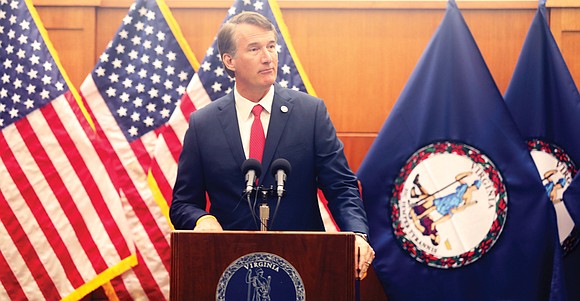Gov. Youngkin blames low NAEP scores on former Va. leaders
Holly Rodriguez | 10/27/2022, 6 p.m.

The 2022 National Assessment of Educational Progress (NAEP) results, released this week, show that for the first time in 30 years, Virginia’s fourth-grade students have fallen below the national average in reading and are barely above the national average in math.
Gov. Youngkin, a Republican who was elected in November 2021, quickly blamed the low scores on the past two Virginia administrations led by Democrats.
Calling the results “catastrophic,” he said that the bulk of the blame does not lie with the pandemic.
“The past number of years, clearly indicate that too many of Virginia’s leaders did not meet that obligation to provide an excellent and outstanding education for our children,” he said at a news conference in Richmond highlighting Virginia’s performance on the NAEP results.
“I hope we’re all shocked, because we should be,” he said.
The test was administered to hundreds of thousands of fourth- and eighth-graders throughout the country this year. It’s typically given every two years, but the 2021 administration was postponed due to the coronavirus pandemic.
The results showed lower average scores in both reading and math among fourth-graders, as well as lower eighth-grade math scores, though eighth-grade reading scores were not significantly different than in 2019.
According to an analysis of Virginia’s results by the Youngkin administration, fourth-graders in Virginia between 2017 and 2022 saw the largest declines in reading and math in the nation.
Gov. Youngkin said that decisions made by former administrations led by Virginia governors Ralph Northam and Terry McAuliffe included: the Virginia Department of Education lowering accreditation standards in 2017; lowering of proficiency standards in math in 2019; and during the pandemic, delays in reopening schools, leaving many Virginia students to learn virtually.
Such actions resulted in declines in SOL scores, declines in the number of students taking Advanced Placement (AP) curriculum and sitting for the exams; and college-level educators reporting that Virginia high school graduates are not college-ready.
Dr. James Fedderman, president of the Virginia Education Association, a union of teachers and support staff, said in a statement that Gov. Youngkin’s proposals fall short, including by failing to offer “a dime of new spending.”
“Addressing our real challenges in public schools will take real targeted investments in what’s proven to work: competi- tive pay, adequate support staff, after school activities, teacher mentorship programs, small class sizes, and modern school infrastructure,” Dr. Fedderman said.
Senate Democrats accused the governor, who has been zipping around the country in recent months to campaign with GOP midterm candidates, of politicizing the issue and pointing fingers.
“In a time where we need proper leadership from the governor, instead of taking time off the road to find solutions to learning loss problems in Virginia’s schools, he’d instead place the blame on previous administrations,” said Sen. Louise Lucas, who chairs the Senate Education and Health committee. “While Youngkin is trying to prove he is fit for national leadership, he isn’t dealing with the problems in his Commonwealth.”
Richmond Public Schools Superintendent Jason Kamras would not directly comment on the Gov. Youngkin’s comments, but his office issued the following statement:
“We are staying the course with the plans that we have in place regarding literacy, math (and science) to address learning loss and declines after COVID. While we had declines, per the SOLs, as a reminder, our declines, for certain subgroups, especially in math, were less than the state. We were recently featured in the New York Times because of our tremendous work with the science of reading.”
The Associated Press contributed to this article.






